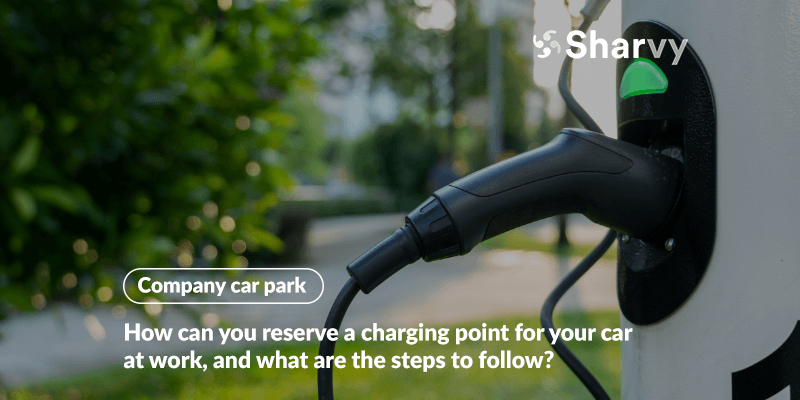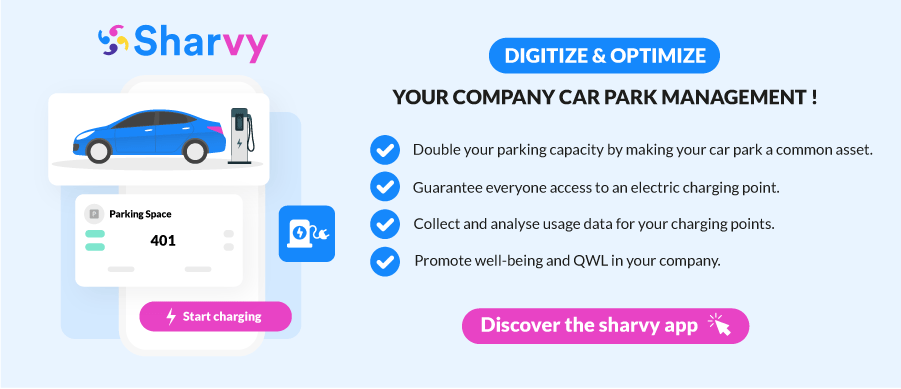With the rise in popularity of electric vehicles, the question of recharging is becoming essential for drivers. If you own an electric car, you’ve no doubt already thought about how to manage your daily journeys, as well as the most practical recharging solution.
But what if the answer was right at your workplace? More and more companies are offering their employees the chance to recharge their vehicles during working hours, often via a reservation system.
But how does this work in practice? What options are available & how can you make the most of them? This article explains everything you need to know about the subject, from booking to managing chargepoints, and the benefits for your employees and your company. Focus!
Why should your company adopt a reservation system for charging stations?
The answer is simple: anticipation and fluidity.
And to back up what we’re saying, let’s look at two statistics :
- 80% : the average availability rate for public charging points. This means that charging points are unavailable for technical reasons around 20% of the time (either undergoing maintenance or out of service). However, if public charging points are not always available, users need to be able to rely on other solutions…
- 60% : the percentage of British people who expect to be able to recharge their vehicle at work. That’s the solution. For employees who regularly work on site, recharging during the working day is no longer a luxury, but a necessity. As cars are parked for several hours, these time slots are ideal for recharging.
However, if the demand for recharging increases, it becomes essential to guarantee fair & optimised use of these facilities. That’s where a reservation system comes in. By allowing your employees to reserve a parking space equipped with a charging point, you avoid the frustrations associated with the availability of charging points.
For employees, it saves a considerable amount of time: the headache of finding an available pay station is over. They no longer have to worry about their car’s range at the end of the day, or about relying on the public network (which is often insufficient, if not overloaded). They know that when they arrive at the office, their car can be recharged at their leisure during the working day. No detours, no unnecessary loss of time, just peace of mind.
For your company, this is a real asset in terms of employee loyalty. It shows that you (really) care about their needs, that you understand the challenges of using an electric vehicle on a daily basis and that you support them in their ecological transition.
How does reserving a charging point at work work work?
1. Advance booking via a dedicated management application, such as Sharvy.
The introduction of a reservation system is (very often) based on a dedicated management application, offering each employee the possibility of reserving in advance a parking space equipped with a charging point for recharging their car at work, for a full day or half a day.
To avoid any imbalance in the allocation of spaces, these tools are generally based on intelligent algorithms that take several criteria into account: frequency of use, but also the status of the user (holder/requestor) and their level of priority (on a scale of 0 to 100).
The Sharvy application, for example, also incorporates an equitable algorithm that gives priority access to terminals to employees who have used them the least over the last 60 days. This planning not only helps to anticipate needs & ensure efficient rotation of equipped parking spaces.
Finally, the process of reserving a charging point via the Sharvy application is simple: just create a user account, then select the day or half-day you want. The application then automatically allocates a parking space to the employee (with or without the space number). By default, the reservation is confirmed one day in advance, but this option can be changed directly in the application according to the company’s preferences.
2. How to access the charging points at work.
Once a reservation has been made, there are a number of ways of securing access to the charging points: RFID badges, access control to the car park (IoT module, ANPR system).
These solutions can be used to authenticate the user & ensure that only people who have made a reservation can access the chargepoints, thus preventing any misuse, such as unjustified prolonged occupation.
- RFID badge : Each employee can be issued with an RFID badge, which enables them to activate the reserved charging point by approaching the reader. This simple, effective system ensures that only the person who made the reservation can unlock the charging point. It also provides precise tracking of charging sessions, by associating each use with a specific user.
- ANPR system : To guarantee exclusive access for employees who have reserved a charging point, the company can also install a camera at the car park entrance, with an Automatic Number Plate Reader (ANPR). This means that when an employee reserves a charging point, their vehicle is automatically authorised to enter the car park on the date and at the time specified. Only registered cars are granted this access, and are able to unlock the pay station at the parking space in question. This prevents misuse of the recharging infrastructure and optimises parking management.
- IoT module : When employees arrive on site, they don’t need a physical badge; the dedicated management application detects their reservation & automatically displays a button to open the company car park barrier. Only employees with a (valid) reservation see this option on their application, guaranteeing exclusive access for authorised users. Similarly, the « Start recharging button » can only be accessed from the application of the employee who reserved the chargepoint. This prevents fraudulent activation and ensures optimum management of the infrastructure. Thanks to this real-time synchronisation, each user can easily control their access and recharging.
Finally, bear in mind that the ANPR system & the IoT module can only work (to use a terminal) with a dedicated management application, such as Sharvy. This centralises reservations, controls access and optimises resource allocation.
It also enables real-time monitoring of the power delivered and the energy recharged (in kW), providing total transparency on consumption and facilitating infrastructure management.
There’s no doubt about it : by integrating a system like this, your company can streamline the management of its charging points, while avoiding conflicts of use and misuse.
3. Charging for the use of charging points to recharge your car at work.
Of course, you can make the charging points in your car park available to your employees free of charge. But if you want to charge your employees for recharging, then it’s essential to define your invoicing model.
There are three options available to you, each with its own advantages and disadvantages.
- Time-based charging : this encourages vehicle rotation by charging for use over time. However, it can be unfair, penalising slower-charging vehicles such as some plug-in hybrids.
- Billing per kWh : this is fairer and more transparent. The company will charge an equivalent amount per kWh (since it is forbidden by law to charge directly per kWh), including use of the charging point, kWh and parking. However, unlike time-based invoicing, this model does not encourage your employees to vacate the space quickly.
- Flat-rate billing : this is based on a fixed rate, often in the form of a monthly subscription. This model simplifies management and allows your employees to anticipate their recharging costs. However, it does not reflect actual electricity consumption and does not take into account any absences, which can lead to discrepancies between actual usage and the price paid.
Dedicated applications, such as Sharvy, allow you to monitor all charging data in real time (list of charges, date, duration, users, energy charged) and use a dashboard to check your consumption and the status of your charging points.
So you can keep an eye on their availability. In the event of a malfunction, an alert is sent from the Sharvy application. At the same time, indicator lights on the bollards are visible and show the status of the bollard.
However, what solutions are planned to prevent abusive occupation of parking spaces equipped with a pay station?
To avoid abuse and inappropriate behaviour by certain employees, it is essential to put in place a dedicated parking policy for your company. There’s nothing more frustrating for an employee than arriving at work to find that a space equipped with a chargepoint is occupied by a vehicle that isn’t even charging!
Fortunately, solutions exist to ensure fairer use and avoid this kind of inconvenience. For example, via the Sharvy application (only), you can :
- Punish abusive behaviour by automatically adjusting the chances of allocating bollards (like parking spaces) in the company car park. For example, if a user tends to reserve a chargepoint and not use it, or to leave their vehicle plugged in long after charging has finished, their access to chargepoints can be reduced by the administrator from the application.
- Use a credit system. Each employee has a quota for access to the chargepoints, which can be adjusted according to usage. In the event of repeated abuse, these credits can be reduced to encourage more responsible use. The application can also be used to report misuse in real time, particularly when a combustion-powered vehicle is occupying a space reserved for electric vehicles, or when a car is hogging a charging point for no reason. All you need to do is report the incident with a photo of the number plate, and the administrator will be able to intervene quickly.
- Restrict access to the bollards for certain users, in the most problematic cases. For example, a person who does not comply with the rules may be restricted to standard parking spaces, with no access to the charging points.
Thanks to these various measures, you can ensure that everyone can take advantage of the recharging facilities in the best possible conditions, without stress or frustration. And above all, it helps to establish a climate of respect and responsibility among colleagues!
In conclusion
There’s no doubt about it: when it comes to recharging your car at work, advance booking is much more than just a convenience : it’s a real asset in ensuring efficient, fair and stress-free management of your recharging facilities.
By enabling your employees to plan their recharging in advance, you can reduce the unexpected and frustrations associated with the unavailability of charging points, while maximising the use of your infrastructure.
Beyond the practical aspect, this organisation demonstrates a real vision of the future on your part, by putting in place innovative solutions that support both the ecological transition and the well-being and productivity of your teams.
Do you have a question? Check the FAQ !
Can charging points be shared between multiple companies?
Of course! This is particularly relevant if you are in a shared office building or if you have several branches. A reservation system, like the one in the Sharvy application, makes it possible to manage access to the terminals in an equitable way, as well as differentiating, for example by allocating different credits to each user in a company. Credits can be adjusted as and when required, ensuring a balanced use of resources for recharging at work.
The application also enables real-time monitoring of the use of charging points, providing total transparency and enabling incidents to be reported quickly. In the event of high demand, priorities can be set according to the needs of each company or employee, optimising access to the charging points during working hours.
Should fast or standard charging be preferred in a company car park?
It all depends on the needs of the users & the average parking time. Standard recharging (AC) is ideal for working days, because it allows stress-free full recharging, while being more economical and less of a burden on the electricity network.
Fast charging (DC), on the other hand, can be useful for fast-moving vehicles, such as those used by frequent commuters, but it is more expensive from the outset and may require more powerful infrastructure.
Want to find out more? Check out our latest articles to stay up to date!
Fairness at work : the foundation of the employee experience ?
What is fairness at work? Why is it so important in the workplace? How can fairness be guaranteed? Find the answers here!
Smart building : the benefits for employees and employers!
What is a smart building? What advantages does it offer? What challenges does it address? Find out in this article.
Company relocation : an opportunity to give a fresh start!
Are you about to carry out a company relocation? In this article, find out our top tips for getting the most out of your move.
Subscribe to our newsletter!
Resources
Contact us
+44 117 463 6990






